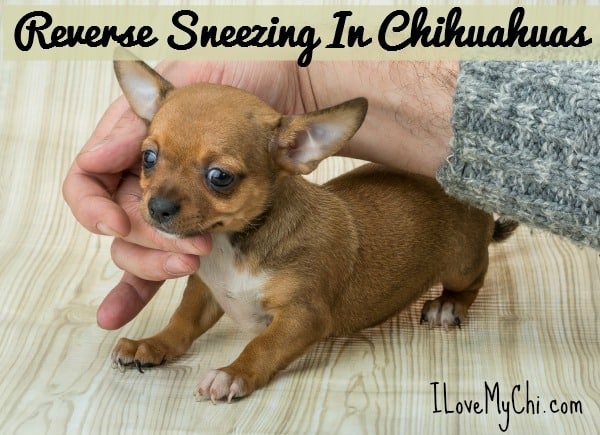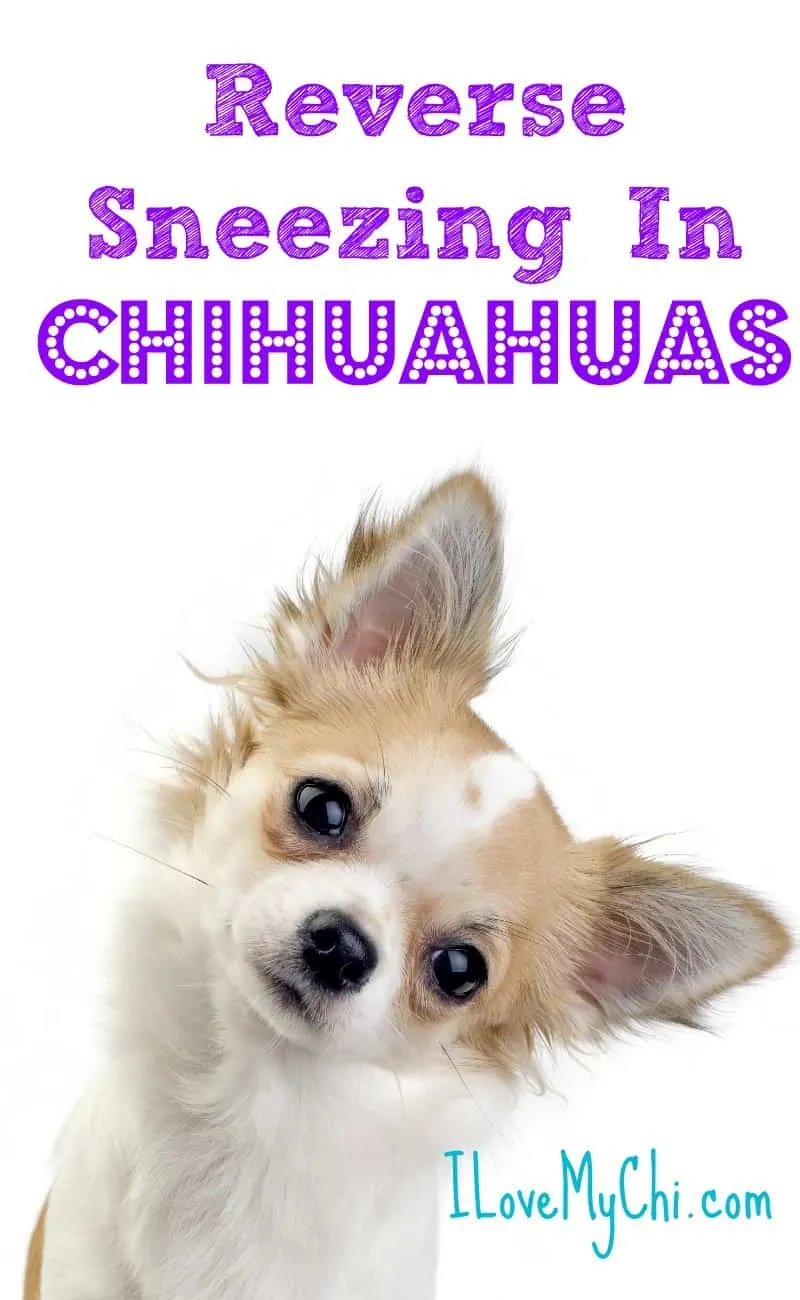Have you ever wondered why your chihuahua reverse sneezes? It’s quite a unique behavior that can be both puzzling and concerning for dog owners. So, why does my chihuahua reverse sneeze? Well, it turns out that reverse sneezing is a common occurrence in this breed, and it’s often triggered by various factors such as excitement, allergies, or irritants in the air. Understanding the reasons behind this behavior can help alleviate your worries and ensure the well-being of your furry companion.
Reverse sneezing is a phenomenon where a dog rapidly pulls air in through their nose, resulting in a distinctive snorting or honking sound. While it may appear alarming, reverse sneezing is typically harmless and rarely causes any serious health issues. Chihuahuas, in particular, have small, narrow nasal passages, making them more prone to reverse sneezing episodes. Additionally, their compact size and delicate respiratory systems make them more sensitive to environmental factors like dust, pollen, or even strong odors. By keeping your chihuahua’s environment clean and minimizing exposure to potential irritants, you can help reduce the frequency and severity of reverse sneezing episodes.

Why Does My Chihuahua Reverse Sneeze?
Chihuahuas are adorable little dogs, known for their big personalities. If you own a Chihuahua, you may have noticed them making strange snorting or reverse sneezing sounds on occasion. While it can be alarming to witness, reverse sneezing is usually harmless and common in this breed. In this article, we will explore the reasons behind why Chihuahuas reverse sneeze and how to manage it.
What is Reverse Sneezing?
Reverse sneezing is a temporary condition that affects many small dog breeds, including Chihuahuas. It is a reflex action where the dog forcefully inhales air through the nose, causing a distinctive snorting or honking sound. Unlike regular sneezing, which expels irritants from the nasal passages, reverse sneezing draws air in.
One theory suggests that reverse sneezing is a way for dogs to clear their nasal passages of irritants, similar to how humans might blow their nose. Another theory suggests that it may occur due to an elongated soft palate, which gets temporarily stuck and obstructs the airway. This can happen when the dog becomes excited, pulls on the leash, or experiences sudden temperature changes.
The Triggers of Reverse Sneezing
Reverse sneezing can be triggered by various factors, and understanding these triggers can help you manage and minimize episodes. Some common triggers include:
1. Excitement: Chihuahuas are known for their high energy levels, and moments of excitement can lead to reverse sneezing episodes.
2. Allergies: Just like humans, dogs can have allergies that irritate their nasal passages, leading to reverse sneezing.
3. Irritants: Exposure to environmental irritants such as pollen, dust, perfume, or cleaning products can trigger reverse sneezing.
4. Eating and drinking: If your Chihuahua eats or drinks too quickly, they may inhale air along with their food or water, causing reverse sneezing.
5. Temperature changes: Sudden changes in temperature, especially moving from a warm location to a colder one, can provoke a reverse sneezing episode.
How to Help Your Chihuahua During a Reverse Sneezing Episode
When you see your Chihuahua experiencing a reverse sneezing episode, it can be distressing. However, there are a few things you can do to help them:
1. Stay calm: Remember, reverse sneezing is usually harmless, so it’s essential to remain calm and avoid panicking, as this can further stress your dog.
2. Massage their throat: Gently massaging your Chihuahua’s throat can help ease the episode by encouraging them to swallow and breathe normally.
3. Offer water: If the reverse sneezing persists, offering your dog a small amount of water may help soothe their throat and alleviate the episode.
4. Distract and relax: Sometimes, distracting your Chihuahua with a treat or toy can help divert their attention and relax them, reducing the intensity and duration of the episode.
When to Seek Veterinary Advice
While reverse sneezing is generally harmless, there are cases where it may indicate an underlying health issue. If you notice any of the following symptoms along with reverse sneezing, it is recommended to consult your veterinarian:
1. Frequent and prolonged episodes of reverse sneezing.
2. Difficulty breathing or gasping for air.
3. Blood in the nasal discharge.
4. Coughing, wheezing, or choking sounds.
5. Nasal discharge that is thick, colored, or foul-smelling.
It’s important to rule out any potential respiratory or nasal issues that may be causing the reverse sneezing.
How to Prevent Reverse Sneezing in Chihuahuas
Reverse sneezing episodes can be unpredictable, but there are preventive measures you can take to minimize their frequency:
Regular Exercise and Playtime
Ensuring that your Chihuahua gets regular exercise and playtime can help reduce their overall excitement levels, decreasing the likelihood of reverse sneezing triggered by excitement.
Avoiding Irritants
Keep your Chihuahua away from potential irritants such as cigarette smoke, strong perfumes, cleaning products, or dusty environments. If your dog has known allergies, work with your veterinarian to manage them effectively.
Slow Feeding and Water Intake
If your Chihuahua tends to inhale their food or water, consider using slow-feed bowls or providing smaller, more frequent meals. Slowing down their eating and drinking can prevent the inhalation of air and reduce the risk of reverse sneezing.
Conclusion
Reverse sneezing is a common and usually harmless condition that affects Chihuahuas and other small dog breeds. Understanding the triggers and taking preventive measures can help manage and minimize episodes. Remember, if your Chihuahua experiences any concerning symptoms or the reverse sneezing becomes frequent or severe, it is always best to consult with your veterinarian for further evaluation and guidance. By providing a calm and reassuring environment for your furry companion, you can help them navigate through reverse sneezing episodes with confidence.
Key Takeaways: Why Does My Chihuahua Reverse Sneeze?
- Reverse sneezing is a common behavior in chihuahuas.
- It is believed to be caused by irritation, allergies, or post-nasal drip.
- Reverse sneezing is not harmful and usually resolves on its own.
- Gently massaging the dog’s throat or offering water may help stop the episode.
- If reverse sneezing occurs frequently or is accompanied by other symptoms, it’s best to consult a veterinarian.
Frequently Asked Questions
In this section, we will address common questions related to chihuahuas and their reverse sneezing behavior. If you’ve ever wondered about why your chihuahua experiences these episodes, you’re in the right place. Let’s dive in and find out more!
1. What causes reverse sneezing in chihuahuas?
Reverse sneezing is a common, harmless condition that affects chihuahuas and other small dog breeds. It occurs when your chihuahua’s soft palate becomes irritated or inflamed, causing them to inhale rapidly and make a snorting or honking sound. Various factors can trigger a reverse sneezing episode, including excitement, allergies, environmental irritants, or even an overexcited collar or leash.
It’s essential to remember that reverse sneezing episodes generally last for a short duration, typically less than a minute. However, if your chihuahua experiences frequent or prolonged episodes, it’s best to consult with a veterinarian to rule out any underlying health issues.
2. How can I help my chihuahua during a reverse sneezing episode?
When your chihuahua experiences a reverse sneezing episode, it can be distressing to witness. However, there are several ways you can help them during these episodes. First, try to remain calm and relaxed, as your chihuahua can pick up on your emotions. Gently rub their throat or softly blow in their face, as this can help normalize their breathing pattern.
If the episode persists, you can try to gently massage your chihuahua’s throat or offer them a small amount of water to encourage swallowing, which can relieve the spasm. Additionally, you can try covering their nostrils for a few seconds, as this can make them swallow and stop the reverse sneezing. However, if their episodes become frequent or severe, it’s crucial to consult with a veterinarian for further evaluation and guidance.
3. Can reverse sneezing be prevented in chihuahuas?
While you may not be able to prevent every reverse sneezing episode in your chihuahua, there are some steps you can take to minimize their occurrence. Firstly, try to identify and avoid any potential triggers, such as dust, pollen, or chemical irritants in their environment. Keeping your chihuahua’s living space clean and free from airborne allergens can help reduce the frequency of episodes.
It’s also essential to provide proper nutrition for your chihuahua to support their overall health. A balanced diet that includes high-quality food can strengthen their immune system and reduce the likelihood of allergic reactions that may contribute to reverse sneezing. Lastly, avoiding overexcitement and extreme temperatures can also be helpful in preventing episodes, as these factors can lead to increased nasal irritation in chihuahuas.
4. Is reverse sneezing harmful to chihuahuas?
No, reverse sneezing is generally not harmful to chihuahuas. Most episodes are brief and resolve on their own without any long-term effects. However, it’s important to monitor your chihuahua and observe any changes in their behavior. If you notice that the frequency, duration, or intensity of their reverse sneezing episodes increase, it’s advisable to consult with a veterinarian to rule out any underlying health conditions.
Remember, reverse sneezing is a common occurrence in chihuahuas and other small dog breeds. Maintaining a calm and supportive environment for your chihuahua during these episodes can help alleviate their discomfort and ensure their well-being.
5. When should I be concerned about my chihuahua’s reverse sneezing?
While reverse sneezing is generally harmless, there are situations when it’s important to seek veterinary attention for your chihuahua. If your chihuahua experiences frequent or prolonged episodes, has difficulty breathing, becomes lethargic, or begins coughing or gagging, these could be signs of an underlying issue that requires professional evaluation.
If you’re unsure or concerned about your chihuahua’s reverse sneezing, it’s always best to consult with a veterinarian. They can provide an accurate diagnosis, rule out any potential health problems, and offer guidance tailored to your chihuahua’s specific needs.

